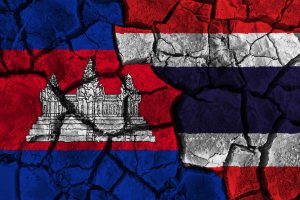Thailand’s army says that another of its soldiers has been injured by a landmine along the disputed border with Cambodia, describing alleged Cambodian mine-laying as a “major obstacle” to ongoing bilateral peace talks.
In a press conference yesterday, the Maj. Gen. Winthai Suvaree, a spokesperson for the Royal Thai Army (RTA), said that a Thai soldier lost his lower right leg after stepping on a mine close to Ta Kwai temple (Ta Krabei in Khmer) on the border between Thailand’s Surin province and Cambodia’s Oddar Meanchey province.
According to the Thai government, this is the sixth such incident to occur along the border, and the third since the two sides agreed to a ceasefire in Malaysia on July 28. As in the earlier instances, it accused Cambodia of planting the mines, in violation of its commitments under the Ottawa Convention.
“The deliberate planting of landmines to target our personnel is an intentional act with malicious intent,” Winthai told the media. “These recurring incidents in border areas reflect Cambodia’s hostile and continuous behavior in threatening our side and violating Thailand’s territorial integrity, which is contrary to the ceasefire agreement reached at the recent GBC meeting.”
The alleged landmine explosions run the risk of breaking the ceasefire that has held, despite considerable ongoing tension, for the past month. Landmine explosions on July 16 and July 23 prompted Bangkok to recall its ambassador from Phnom Penh, and precipitated the initial outbreak of hostilities between the two nations on July 24. The RTA claims that another soldier was injured by a landmine on July 28, just before the ceasefire between the two nations took effect.
The RTA also claims that three Thai soldiers were injured by a landmine on August 9, while on a similar patrol on the border between Thailand’s Sisaket province and Cambodia’s Preah Vihear province. Another explosion then took place on August 12, in the vicinity of Ta Moan Thom temple, the RTA claimed.
As with all of these past cases, the Cambodian government issued a strong denial, repeating its past claim that the border region is littered with landmines left over from past conflicts. In a statement, the Cambodian Mine Action and Victim Assistance Authority (CMAA) said that the Thai accusation was “baseless and lacking credible evidence,” the Phnom Penh Post reported.
The CMAA reaffirmed Cambodia’s commitment to the Ottawa Convention and the July 28 ceasefire agreement. “We appeal to all stakeholders to resolve this matter responsibly, uphold peace along the border, and ensure the safety of both Cambodian and Thai citizens,” the statement said. “We urge Thailand to strictly adhere to the ceasefire agreement by refraining from any troop movement during this period.”
As the border dispute drags on, Thailand’s government has decided to use the landmine issue as a primary means of swaying international public opinion to its side. It has announced plans to submit evidence to the Ottawa Convention’s governing body in Geneva, accusing Cambodia of violating the international landmine ban. In recent weeks, it has welcomed foreign media to a remote part of Sisaket province, where it displayed Soviet-made PMN-2 mines that it claimed to have recovered after the recent landmine explosions, as well as unarmed PMN-2s that it claims were previously in the possession of Cambodian forces.
Last week, the Royal Thai Navy also released photos and video footage that it claimed to have recovered from a Cambodian soldier’s phone, purporting to show Cambodian personnel laying PMN-2 mines. Cambodia’s government subsequently claimed that the evidence was fabricated.
As Marwaan Macan-Markar noted this week in an article for Nikkei Asia, Thailand’s attempt to internationalize the landmine issue marks a rare break from its long-standing preference for dealing with military issues on a bilateral level. So far, Bangkok has dismissed out of hand Cambodia’s suggestion that the two nations seek a ruling from the International Court of Justice, which ruled in Cambodia’s favor over Preah Vihear temple twice, in 1962 and 2013.
Macan-Markar quoted one foreign diplomat as saying that Thailand has “an almost reflexive aversion to internationalization.” The fact that the Thai government is now taking such a route perhaps suggests a dawning awareness despite its significant military advantage over its neighbor, it is currently being bested in the political and international public relations battle.

































